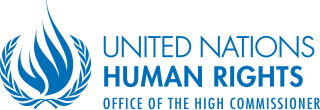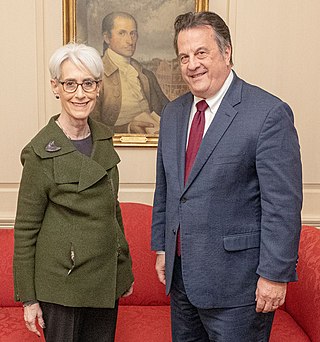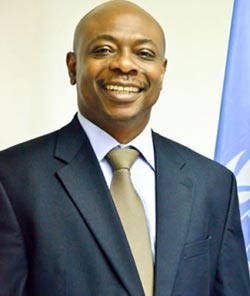Sally Fegan-Wyles currently serves as the Acting Head of the United Nations Institute for Training and Research (UNITAR). She was appointed to this position by the United Nations Secretary-General Ban Ki-moon on 10 September 2012. Prior to this, she was Senior Adviser on System-Wide Coherence in the Office of the Deputy Secretary-General of the United Nations.
Previously, she served as Director of the UN Development Group Office (UNDG), responsible for guiding and supporting the UN's reform efforts at the country level. She was policy fellow in the Carr Centre for Human Rights Policy at Harvard Kennedy School at Harvard University.[ citation needed ]
She has been a UN staff member for 28 years, mainly working in Africa as UNICEF Representative to Liberia, Uganda, Zimbabwe, or UN Resident Coordinator to Tanzania. As Director of the UNDG, she is responsible for policy support to the UN Country Team and the UN Resident Coordinator in 134 countries, and for the implementation of the ongoing UN reform initiative, including the "One UN" approach being piloted in eight Countries. Some programs Sally pioneered include designing the first UN response to HIV/Aids in Uganda in 1985, leading the international community response to the Zimbabwe drought of 1991, and providing social policy advice to the new Museveni Government in Uganda, during and after the civil war. She is an Irish national and a graduate of Trinity College, Dublin and London School of Economics in economics and social planning.[ citation needed ]

The Office of the United Nations High Commissioner for Human Rights, commonly known as the Office of the High Commissioner for Human Rights (OHCHR) or the United Nations Human Rights Office, is a department of the Secretariat of the United Nations that works to promote and protect human rights that are guaranteed under international law and stipulated in the Universal Declaration of Human Rights of 1948. The office was established by the United Nations General Assembly on 20 December 1993 in the wake of the 1993 World Conference on Human Rights.
The United Nations Development Programme (UNDP) is a United Nations agency tasked with helping countries eliminate poverty and achieve sustainable economic growth and human development. The UNDP emphasizes developing local capacity towards long-term self-sufficiency and prosperity.

Jomo Kwame Sundaram, fondly known just as Jomo, is a prominent Malaysian economist. He is a senior adviser at the Khazanah Research Institute, visiting fellow at the Initiative for Policy Dialogue, Columbia University, and an adjunct professor at the International Islamic University (IIUM).

The United Nations Office for the Coordination of Humanitarian Affairs (OCHA) is a United Nations (UN) body established in December 1991 by the General Assembly to strengthen the international response to complex emergencies and natural disasters. It is the successor to the Office of the United Nations Disaster Relief Coordinator (UNDRO).
Sakiko Fukuda-Parr is a development economist who has gained recognition for her work with the United Nations Development Programme (UNDP) and for her writing in publications including the Journal of Human Development and Capabilities, which she founded.
The United Nations Sustainable Development Group (UNSDG), previously the United Nations Development Group (UNDG), is a consortium of 36 United Nations funds, programmes, specialized agencies, departments and offices that play a role in development. It was created by the Secretary-General of the United Nations in order to improve the effectiveness of United Nations development activities at the country level.

David Gressly is the United Nations Resident Coordinator / Humanitarian Coordinator for Yemen Prior to that he was the United Nations Deputy Special Representative for the Democratic Republic of the Congo. He also previously served as Deputy Special Representative in the United Nations Multidimensional Integrated Stabilization Mission in Mali (MINUSMA).
A United Nations Resident Coordinator is the highest United Nations official and the chief of UN diplomatic mission in a country.

The United Nations Department of Economic and Social Affairs is part of the United Nations Secretariat and is responsible for the follow-up to major United Nations Summits and Conferences, as well as services to the United Nations Economic and Social Council and the Second and Third Committees of the United Nations General Assembly. UN DESA assists countries around the world in agenda-setting and decision-making with the goal of meeting their economic, social and environmental challenges. It supports international cooperation to promote sustainable development for all, having as a foundation the 2030 Agenda for Sustainable Development and the 17 Sustainable Development Goals (SDGs) as adopted by the UN General Assembly on 25 September 2015. In providing a broad range of analytical products, policy advice, and technical assistance, UN DESA effectively translates global commitments in the economic, social and environmental spheres into national policies and actions and continues to play a key role in monitoring progress towards internationally agreed-upon development goals. It is also a member of the United Nations Development Group.

Alan Claude Doss is a British international civil servant who has spent his entire professional life in the service of the United Nations, working on peacekeeping, development and humanitarian assignments in Africa, Asia and Europe as well as at United Nations Headquarters in New York City.

Rachel N. Mayanja is a Ugandan lawyer and diplomat. Currently, she serves as the United Nations Secretary-General's Special Adviser on Gender Issues and Advancement of Women. She was appointed to that position by the United Nations Secretary-General in 2004. The appointment is at the level of Assistant Secretary-General.
Dr. Michel Sidibé is the African Union Special Envoy for the African Medicines Agency (AMA). He was the Minister of Health and Social Affairs of Mali. A creator of a people-centered approach to health and development, and a strong advocate for social justice, Sidibé was the second Executive Director of UNAIDS, serving from January 2009 until May 2019. He held the rank of Under-Secretary-General.
The United Nations Entity for Gender Equality and the Empowerment of Women, also known as UN Women, is a United Nations entity working for gender equality and the empowerment of women. UN Women advocates for the rights of women and girls, and focuses on a wide array of issues, including violence against women and violence against LGBTIQ+ people.

John Hendra recently established his own consulting practice after retiring from a dynamic 32 year United Nations career as a development leader in both Headquarters and the field. Hendra recently served as a member of the High-Level Group to review the governance of The Commonwealth and is currently serving on: the Advisory Council to Canada's Development Finance Institution ; on the board of Women Deliver Canada; and as an Associate Researcher with the German Development Institute (GDI).

The Post-2015 Development Agenda was a process from 2012 to 2015 led by the United Nations to define the future global development framework that would succeed the Millennium Development Goals. The new framework, starting from 2016 is called Sustainable Development Goals.

Agnès Callamard is a French human-rights activist who is the Secretary General of Amnesty International. She was previously the Special Rapporteur on extrajudicial, summary, or arbitrary executions appointed by the United Nations Human Rights Council, and the former Director of the Columbia University Global Freedom of Expression project.
Susan McDade is a Canadian economist and energy expert. She is currently the Assistant Administrator and Director of the Bureau for Management Services at the United Nations Development Programme.

Alain Noudéhou is a Beninese diplomat who has been serving as Deputy Special Representative for the United Nations Multidimensional Integrated Stabilization Mission in Mali (MINUSMA) and Resident Coordinator in Mali since 2021, serving alongside Special Representative Mahamat Saleh Annadif. He was previously the Deputy Special Representative of the Secretary-General of the United Nations, Resident Coordinator, and Humanitarian Coordinator in South Sudan.

Shombi Sharp is an American diplomat with the United Nations, UN Resident Coordinator in India․
Thelma Awori is a Ugandan professor, former Assistant Secretary-General of the United Nations, and feminist. She was born on March 25, 1943, in Monrovia, Liberia and came to Uganda in 1965. She is a former Uganda People's Congress diehard, who defected to the Movement. She is an individual African feminist who believes in justice for women and the validity of women’s perspectives. She sadly found an extremely high prevalence of internalized oppression due to religion and socialization.